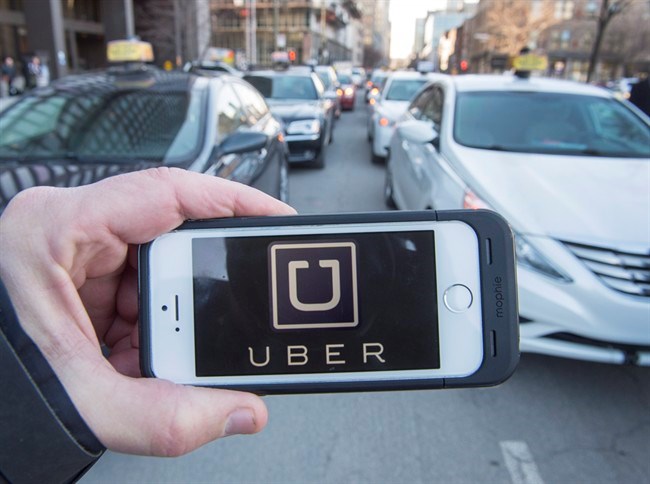The B.C. government is shrugging aside a new marketing campaign by ride-hailing company Uber, saying it won’t be pressured into allowing the service to operate in the province until it has finished a larger review of taxi licensing.
TransLink Minister Peter Fassbender said he wasn’t surprised to see Uber launch radio ads and a letter-writing campaign Wednesday targeting Premier Christy Clark.
The Uber ads discuss long wait times for traditional taxis in places like Surrey, and detail how B.C. is falling behind Seattle, Toronto and other major cities in allowing the service.
The company also added a “future view” feature to its Uber app, simulating how cars with wait times of five minutes or less would respond to requests in Vancouver, Victoria and Kelowna.
But the campaign failed to sway Fassbender, whom the premier has charged with reviewing the possible impact of Uber in the province.
“The province is going to take a very deliberate and thoughtful approach to this, and we are not going to be pressured into doing something quickly without ensuring we have adequate input from a variety of sources, including the taxi industry, local governments [and] the business community,” Fassbender said in an interview. “I’ve been actively doing that outreach.”
Fassbender refused to say when he expects to finish that review, but said he has scheduled meetings with the Vancouver Board of Trade and the Metro Vancouver board on the issue.
The goal remains a “made in B.C. solution” that respects the existing traditional taxi industry, examines the province’s overall taxi licensing system, and explores the insurance and safety impacts of allowing Uber and other on-demand car services into the economy, said Fassbender.
Uber Canada general manager Ian Black released a public letter to Clark, saying the approval of Uber in B.C. would empower people to earn extra income, reduce drunk driving, combat congestion and expand the reach of the transit network.
Vancouver is the largest city in North America without Uber, and more than 225,000 residents and tourists opened the app in the province looking for a ride in 2015, he wrote.
“British Columbians have made clear their overwhelming support for ushering in the benefits of the sharing economy. Almost 70 per cent support the immediate introduction of ridesharing,” wrote Black. “It is time for the province to embrace the mantra as the party of yes when it comes to ridesharing.”
Uber, and similar outfits such as Lyfts, refers to itself as a “ride-sharing” company, although it operates as an on-demand car service that connects passengers with private drivers.
Uber has asked B.C. to create a special licensing scheme for its drivers, separate from the traditional taxi industry.
The governing B.C. Liberal party flirted with the Uber issue during two byelections earlier this year, allowing its candidates to heavily promote the service as part of a “sharing economy” the Liberals wish to cultivate.
Fassbender has said Uber is only one part of his review, and that he is also looking at the complex system of provincial and municipal taxi license regulations, as well as preparing for the first review of the Passenger Transportation Act in 30 years.
“It isn’t simplistic, and that’s why we want to make sure we do it well.”



